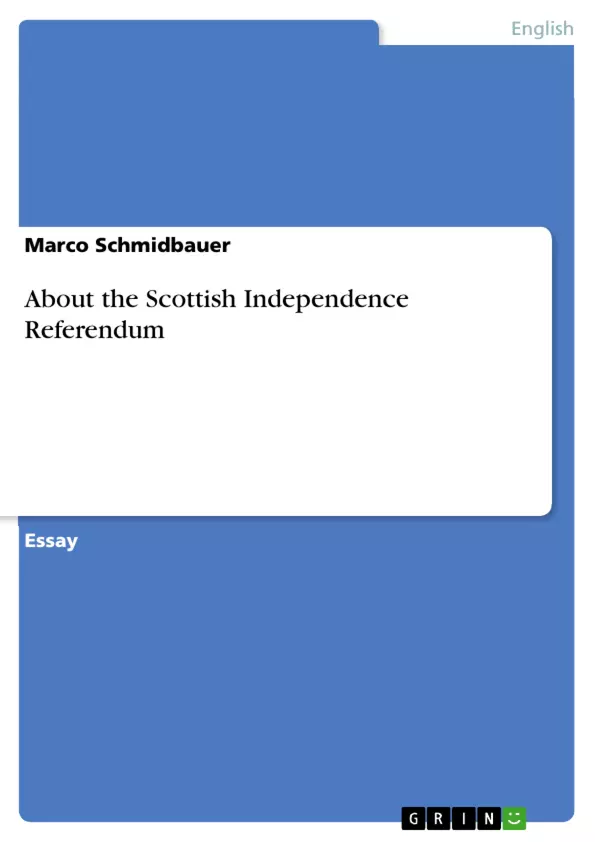Term Paper about the scottish independence referendum
"We are bought and sold for English gold. Such a parcel of rogues in a nation." - Scotland's famous bard Robert Burns. It is said that personal financial interests, triggered through the failure of the Darien Scheme, a colonization project by the Kingdom of Scotland, and bribery led to the Acts of Union between the Parliaments of Scotland and England on 1 May 1707. The two Parliaments united and formed the Parliament of Great Britain. Since then, many individuals and organizations have advocated the return of a Scottish Parliament. Moreover, some have argued for devolution - a Scottish Parliament within the United Kingdom - whereas others have demanded complete independence. While the first referendum on a stronger devolution in 1979 failed, the second one in 1997 has been a success, leading to the Scotland Act of 1998 being passed and the Scottish Parliament being established in 1999. After its formation in 1934, the Scottish National Party won its first election in 2007 and, again, in 2011, delivering the first majority government since the opening of Holyrood - the law making body of Edinburgh. With the overall majority, and the Scottish Parliament combined, the case for Scottish Independence strongly reoccurs these days. Alex Salmond, the leader of the Scottish National Party and current First Minister of Scotland, is one of the main proponents of Scottish Independence, now intending to hold a referendum on this issue in the autumn of 2014. There are several points speaking in favor of independence but equal as many against it. Before weighing the pros and the cons of the issue, I will start off with a narrow description of the voting system and the questions concerning the referendum bill in general.
Inhaltsverzeichnis (Table of Contents)
- The Date of the referendum
- The Question of the referendum
- Three Possible Outcomes
- The Status Quo
- Devo Max
- Scottish Independence
Zielsetzung und Themenschwerpunkte (Objectives and Key Themes)
This paper aims to provide a comprehensive overview of the arguments for and against Scottish independence in the context of the upcoming 2014 referendum. It will analyze the proposed voting system, the key questions surrounding the referendum bill, and the potential consequences of each possible outcome for Scotland and the United Kingdom.
- The complexities of the Scottish Independence Referendum
- The pros and cons of Scottish independence
- The impact of independence on Scotland's economy and security
- The potential for increased devolution within the UK
- The political landscape surrounding the referendum
Zusammenfassung der Kapitel (Chapter Summaries)
- The Date of the referendum: This section explores the controversy surrounding the proposed date of the referendum, particularly the potential impact of the 2014 Commonwealth Games and the Ryder Cup on the outcome.
- The Question of the referendum: This section delves into the debate surrounding the referendum question, specifically the potential inclusion of a "devo max" option alongside the question of independence.
- Three Possible Outcomes: This section outlines the three main potential outcomes of the referendum: the status quo, devo max, and full independence. Each outcome is described in detail, including its implications for Scotland and the UK.
- The Status Quo: This section presents arguments both for and against maintaining the current relationship between Scotland and the UK, including the benefits of shared security and economic stability. It also highlights concerns about Scotland's representation in Westminster and the dominance of parties that are not favored by the Scottish electorate.
- Devo Max: This section examines the proposed "devo max" option, which would grant Scotland greater control over taxation and spending while maintaining the UK's authority over defense and foreign affairs. It highlights both the potential advantages and disadvantages of this option, including the possibility of undermining the unity of the UK.
- Scottish Independence: This section discusses the potential consequences of Scottish independence, including the economic risks and challenges of establishing a new national identity. It also highlights the opportunities presented by independence, such as access to North Sea oil and the potential for joining the European Union.
Schlüsselwörter (Keywords)
The Scottish Independence Referendum, devolution, status quo, devo max, full independence, economic risks, security, North Sea oil, European Union, Scottish National Party, Unionists, political parties, Westminster, Scottish Parliament, voting system, referendum question, possible outcomes.
Frequently Asked Questions
What was the historical origin of the union between Scotland and England?
The Acts of Union in 1707 united the Parliaments of Scotland and England to form the Parliament of Great Britain, a move influenced by the failure of the Darien Scheme and various financial interests.
Who was a leading proponent of the 2014 Scottish Independence Referendum?
Alex Salmond, the leader of the Scottish National Party (SNP) and First Minister of Scotland at the time, was a main proponent of the referendum.
What are the three possible outcomes discussed for the referendum?
The three main outcomes analyzed are maintaining the status quo, "Devo Max" (maximum devolution), and full national independence.
What does the term "Devo Max" refer to?
Devo Max refers to a proposal where Scotland would gain full control over taxation and spending while the UK would retain authority over defense and foreign affairs.
What were some arguments in favor of Scottish independence?
Arguments in favor included direct access to North Sea oil revenues, the potential for independent membership in the European Union, and the ability for Scotland to govern itself without Westminster's dominance.
Why was the date of the 2014 referendum controversial?
The controversy surrounded the potential influence of major events like the 2014 Commonwealth Games and the Ryder Cup on the voting outcome and public sentiment.
- Citation du texte
- Marco Schmidbauer (Auteur), 2012, About the Scottish Independence Referendum, Munich, GRIN Verlag, https://www.grin.com/document/388670



